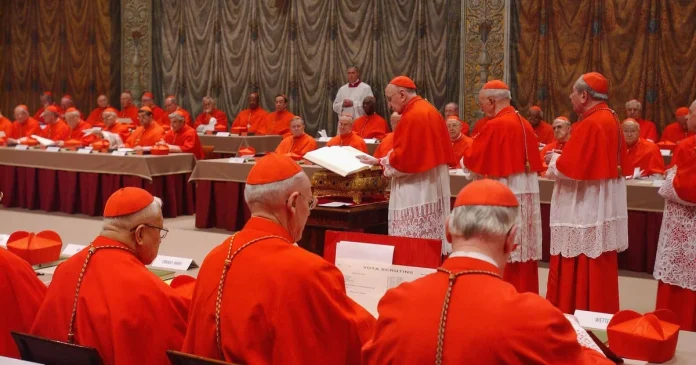Following the death of Pope Francis, the Vatican is preparing for the Papal Conclave, where the College of Cardinals will gather to elect a new pope. While films like Conclave have depicted the political manoeuvring behind the process, the real-life election remains a significant event filled with tension and anticipation as the cardinals select the future leader of the Catholic Church.
What is the Papal Conclave?
The Papal Conclave is the process in which the College of Cardinals selects a new pope. This tradition has developed over centuries. In the past, local clergy and laypeople selected the pope, but the Church began to formalise the process in the 13th century. By the 17th century, the conclave reached its current form.
When does the Conclave begin?
The conclave usually begins 15 to 20 days after the pope’s death or resignation, which in this case would likely fall between 6 and 11 May. If all eligible cardinals arrive early, the conclave could start sooner. Once the electors gather, they will take an oath of secrecy before entering the Sistine Chapel. They will remain in isolation until the election concludes.
The voting process
The process of voting follows a well-established procedure. Two masters of ceremony, chosen from the non-voting cardinals, distribute ballots to the electors. Nine cardinals are randomly selected to oversee the voting process. These cardinals act as scrutineers (voting judges), infirmarii (collecting votes from those unable to attend), and revisers (who verify the accuracy of the scrutineers’ work).
After receiving their ballots, each elector writes Eligo in Summum Pontificem (“I elect as Supreme Pontiff”) followed by the name of their chosen candidate. The elector then folds the ballot twice and places it into a container, often a chalice. They swear an oath that their vote is cast with full conscience before depositing it.
After the votes are cast, the scrutineers shake the container to mix the ballots. Then, they transfer the ballots to another vessel for counting. Each vote is read aloud, and the scrutineers check the results. If no candidate achieves the required two-thirds majority, the process repeats. The cardinals conduct two rounds of voting each day, and they burn the ballots after each day’s voting. Black smoke signals an inconclusive vote, while white smoke indicates the election of a new pope.
What happens after the vote?
The voting schedule includes three days of voting followed by a day of rest. Afterward, the cardinals hold seven rounds of voting, with breaks between them. If the cardinals do not elect a pope after 12 or 13 days, they may change the rules to allow a simple majority vote, which speeds up the process.
Once a candidate receives the required majority, the cardinals declare him pope. He will choose a papal name, receive the loyalty of the cardinals, and address the faithful in St Peter’s Square.
Who are the leading candidates?
Out of the 252 cardinals at the Vatican, 135 are eligible to vote. These cardinals must be under 80 years old and swear an oath of secrecy before the election begins. Of the 135 eligible cardinals, 108 were appointed by Pope Francis, suggesting that his influence may continue to shape the next papacy.
Geographic distribution of electors
Europe has the largest share of cardinals, with 114, followed by Asia (37), South America (32), Africa (29), North America (28), Central America (8), and Oceania (4).
The key frontrunners
Several candidates have emerged as strong contenders for the papacy:
Cardinal Luis Antonio Tagle (67): Tagle is a leading choice to continue Pope Francis’s progressive direction. He has vast experience leading the Congregation for the Evangelisation of Peoples and is a trusted member of the Vatican’s inner circle. His Filipino background makes him an attractive candidate, especially as Catholicism continues to grow in Asia.
Cardinal Peter Turkson (76): Known for his advocacy on social justice issues, Turkson has championed causes like poverty, climate change, and economic inequality. As the former head of the Dicastery for Promoting Integral Human Development, he has made these causes central to his work. His election would be historic, as he could become the first African pope in over a thousand years.
Cardinal Péter Erdő (72): Erdő is a respected canon law expert and a strong proponent of traditional Catholic teaching. He previously led the Council of European Bishops’ Conferences, gaining support from those who favour a more conservative approach.
Cardinal Angelo Scola (82): A former Archbishop of Milan, Scola has long been a prominent papal contender. His traditionalist views and theological expertise attract those seeking a more centralised Church, although his age may hinder his chances.
